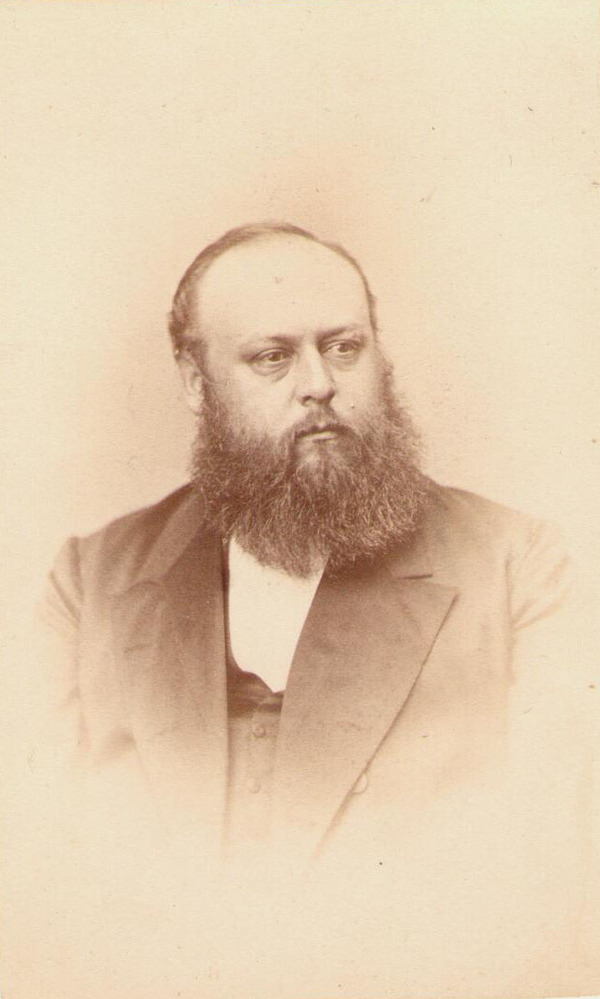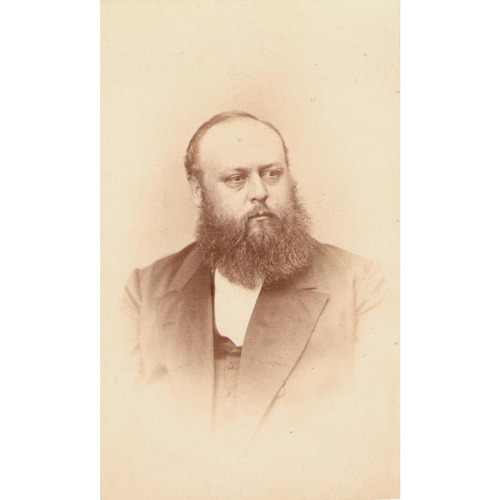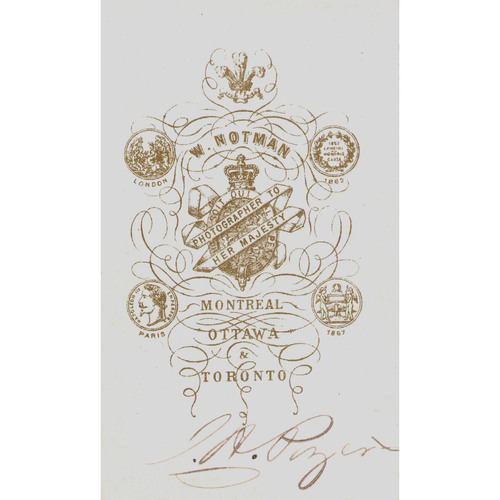
Source: Link
POZER, CHRISTIAN HENRY, lawyer and politician; b. 26 Dec. 1835 at the manor-house in the seigneury of Aubert-Gallion in Beauce, Lower Canada, son of William Pozer and Ann Milbourne; d. unmarried on 18 July 1884 at Saint-Georges, Que.
At the time of Christian Henry Pozer’s birth the settlement of the upper Beauce region had just begun and, in a sense, it was the consolidation of properties in this region and its overall development, together with the prestige of his family, that accounted for the quite rapid advancement of his public career. His childhood was spent on the Aubert-Gallion seigneury, where his father had settled about 1830 in order to develop the fief that Christian’s grandfather, George Pozer*, a Quebec merchant, had bought at the beginning of the century. At first life was rather arduous and lonely but, with the help of a grant from the Royal Institution for the Advancement of Learning, a tutor was engaged to teach the young Pozers. Nothing more definite is known about Christian Henry’s education until he became a clerk in the law office of François-Xavier Lemieux* at Quebec. Called to the bar on 2 June 1860, he is thought to have practised for some time in Quebec City with Édouard Rémillard.
Meanwhile, his father’s position in Beauce had stabilized. In 1852, after a hotly contested lawsuit concerning the estate of Christian’s grandfather, William Pozer had secured confirmation of his titles to the seigneury and of his rights to the local fiefs of Saint-Étienne and Saint-Bernard. After his father’s death in 1861, Christian Henry, who owned substantial grants of land in the townships of Shenley and Metgermette, began to draw his share of the income from the patrimonial estate jointly held by the nine children, the eldest of whom, William Milbourne Pozer, became the chief seigneur of Aubert-Gallion. Rents and other seigneurial dues, sales of land, as well as the operation of several flour-mills and sawmills, at a time when the population was increasing rapidly, guaranteed the family a sizeable income and enabled the young lawyer to pursue his political ambitions free from financial constraints.
Pozer had had his first taste of electoral skirmishing at the time of his legal training, and in 1863 he decided to enter the fray in Beauce, a large constituency with some ten polling stations located in the chief parishes. It required no small amount of boldness to oppose not only the Conservative party and its candidate, Henri-Elzéar Taschereau*, a member of the region’s oldest seigneurial family which had had a decisive influence on local political opinion since the inception of the parliamentary régime, but also the clergy, who were hostile to this Protestant foreigner. Pozer’s challenge unleashed a series of campaigns violent enough to occupy a prominent place in the annals of a period when elections were openly based on brutality, intimidation, and venality. Pozer lost in 1863, but by perfecting the methods that he denounced in his opponents he received twice as many votes as Taschereau in the election of 1867. He won a second victory in 1871 after an even more savage campaign; whisky and money flowed freely, and after each meeting a count was taken of the maimed. Pozer represented Beauce in both Quebec and Ottawa, but continued none the less to retain the good will of his constituents between elections. It is said that each year he visited all the parishes in the county, travelling with a trunk full of coins which he distributed at social gatherings in the evenings, and that his aloof manner, as well as his unusual height and corpulence, invested these proceedings with an air of great dignity.
Pozer’s legislative career was less spectacular. As was the case for many of the opposition members elected to the first Quebec legislature, nothing separated him ideologically from the government party. His infrequent interventions were confined to issues affecting his county (often linked to his own interests) such as the creation of municipalities in various townships, and the defence of land-owners threatened by amendments to the gold-mines law. He played an active part in the government’s promotion of roadbeds with wooden rails (later converted to railways), serving on the first boards of directors of the Levis and Kennebec Railway Company [see Louis-Napoléon Larochelle] and of the Saint-François Valley and Kennebec Railway Company.
Apparently his conduct in the House of Commons was still more circumspect, even when, with the abolition of the double mandate by the provincial government in 1874, he followed to the federal capital some of the prominent figures of the Liberal party, which he had joined in 1863. His self-effacement should not result in his abilities as a loyal and vigilant politician and as an experienced organizer being forgotten. In 1876 the government of Alexander Mackenzie* summoned him to the Senate to represent the division of Lauzon. Pozer continued to live in Beauce with his mother and an unmarried sister, and saw to it that the county was kept within the sphere of influence of the Liberal party, as his correspondence with Wilfrid Laurier* attests.
From the time he took up a political career, he remained only marginally active as a lawyer; he gave up his position as a director of the Levis and Kennebec Railway Company after a few years, and family records suggest that his only other concerns related to the seigneurial rights of his family and to matters of interest to a few clients in the old seigneuries and surrounding townships. Only his real property, bequeathed to his five surviving brothers and sisters, was enumerated in the will that he dictated three years before his death, but there is every indication that this constituted the core of his fortune, and that, in short, behind the politician stood an important land-owner.
McCord Museum (Montreal), Ross papers. Can., House of Commons, Debates, 1867–68. Can., Senate, Debates, 1876–77. Que., Statuts, 1869, c.54, c.58. Achintre, Manuel électoral. P.-G. Roy, Les avocats de la région de Québec. Wallace, Macmillan dict. Philippe Angers, Les seigneurs et premiers censitaires de St-Georges-Beauce et la famille Pozer (Beauceville, Qué., 1927). Philippe Angers et Robert Vézina, Histoire de Saint-Georges de Beauce (Saint-Georges, Qué., 1935). William Chapman, Mines d’or de la Beauce; accompagné d’une carte topographique (Lévis, Qué., 1881). Jean et Marcel Hamelin, Les mœurs électorales dans le Québec de 1791 à nos jours (Montréal, 1962). M. Hamelin, Premières années du parlementarisme québécois. Honorius Provost, Chaudière Kennebec; grand chemin séculaire (Québec, 1974); Sainte-Marie de la Nouvelle-Beauce; histoire civile (Québec, 1970); La vallée de la Chaudière, géographie et histoire; notes d’enseignement ([Québec], 1970). C. A. Scott, The Levis and Kennebec Railway, and its difficulties: a brief history of Larochelle & Scott’s connection with the line from its commencement to the present time (Quebec, 1877).
Cite This Article
Louise Dechêne, “POZER, CHRISTIAN HENRY,” in Dictionary of Canadian Biography, vol. 11, University of Toronto/Université Laval, 2003–, accessed March 1, 2026, https://www.biographi.ca/en/bio/pozer_christian_henry_11E.html.
The citation above shows the format for footnotes and endnotes according to the Chicago manual of style (16th edition). Information to be used in other citation formats:
| Permalink: | https://www.biographi.ca/en/bio/pozer_christian_henry_11E.html |
| Author of Article: | Louise Dechêne |
| Title of Article: | POZER, CHRISTIAN HENRY |
| Publication Name: | Dictionary of Canadian Biography, vol. 11 |
| Publisher: | University of Toronto/Université Laval |
| Year of publication: | 1982 |
| Year of revision: | 1982 |
| Access Date: | March 1, 2026 |




